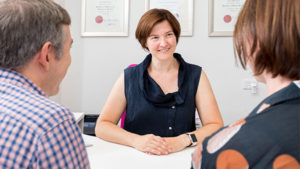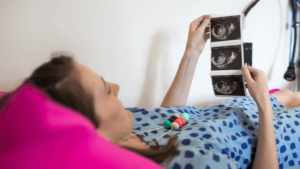Annoying Symptoms
Tiredness & Difficulty Sleeping
Most pregnant women feel tired in the first trimester of pregnancy then experience difficulty sleeping in late pregnancy. In late pregnancy, sleep is easily disturbed by visits to the toilet, heartburn, kicks from the baby or a feeling of discomfort when lying down. Some women may experience disturbing dreams in the last couple of months, which can be due to anxiety about approaching childbirth and parenthood.
The following suggestions may be helpful:
- Make sure you are getting enough iron and protein in your diet.
- Gentle exercise, such as walking in the late afternoon or evening, can promote sleep.
- Avoid caffeine-containing stimulants such as tea, coffee or cola before bedtime.
- Try sleeping on one side with a pillow under your tummy and another pillow between your knees.
- Rest during the day. Relax by soaking in the bath, listening to music, enjoying a massage or meditating before bedtime.
Dizziness
Normal circulatory changes in early pregnancy may leave you feeling a little dizzy. Stress, fatigue and hunger also may play a role. To prevent mild, occasional dizziness, avoid prolonged standing and rise slowly after lying or sitting down. If you start to feel dizzy when driving, pull over. If you’re standing when dizziness hits, sit or lie down. Stay well hydrated and dress in layers to avoid overheating.
Tender Breasts
Increased hormone production may make your breasts unusually sensitive. Your breasts will feel fuller and heavier, and you will probably go up a cup size or two. Wearing a more supportive bra or a sports bra may help.
Increased Urination
You may need to urinate more often as your enlarging womb presses on your bladder. The same pressure may cause you to leak urine when sneezing, coughing or laughing. To help prevent urinary tract infections, urinate whenever you feel the urge. If you’re losing sleep due to middle-of-the-night bathroom trips, drink less in the evening – especially fluids containing caffeine, which can make you urinate more. If you’re worried about leaking urine, panty liners may offer a sense of security.
Haemorrhoids
(Piles) These are swollen veins around the rectum and anus (back passage) that may itch, ache or feel sore. Haemorrhoids may bleed a little and make going to the toilet uncomfortable. They can be triggered by constipation, as well as pressure from the baby’s head.
The following suggestions may be helpful:
- Avoid constipation and straining on the toilet by including plenty of fibre in the diet by eating fruit and vegetables, wholemeal breads and breakfast cereals such as All-Bran.
- Avoid standing for long periods.
- Rectinol ointment, available from pharmacies, can be applied to haemorrhoids that are causing discomfort.
Muscle Cramps
Muscle cramps in the feet, legs or thighs are common during pregnancy, especially at night. The cause of cramps is unclear but the following may help:
- Stretching and massaging the affected muscle.
- Magnesium supplements, which can be bought from pharmacies or health-food stores.
Backache
Most women experience backache at some stage during their pregnancy. The causes include altered posture as the baby grows and hormonal changes, which lead to the loosening of ligaments and greater water retention in the tissues.
The following suggestions may be helpful:
- Be aware of your posture when standing or lifting, and use chairs with good back support when sitting.
- Avoid heavy lifting and prolonged standing.
- Rest with your legs elevated.
- See a physiotherapist for further assistance.
Skin Changes
Pregnancy hormones can change the tone and colour of your skin. The extra blood circulating around your body can cause your skin to “glow". In some women, the pregnancy hormones may cause red patches and increased acne, and areas of your skin may become dry and scaly. You may also notice deeper pigmentation across your face.
Areas of skin that may get darker during pregnancy include underneath eyes, nipples, the genitalia, the inner sides of thighs and armpits. Some women develop a dark line running down the centre of their stomach. Sunlight intensifies areas of skin that are already pigmented and many women find that they tan more easily during pregnancy. Even after birth the deeper pigmented skin will remain darker for some time, but will gradually fade and disappear.
Chloasma – a special form of pigmentation also referred to as the “mask of pregnancy" appears as brown patches on the bridge of the nose, cheeks and neck. Some dark-skinned women develop patches of paler skin on the face and neck. These patches will begin to fade after the baby is born. Make-up can be used to cover up these patches.
Itching
As your baby grows, the skin over your abdomen gets tighter and may cause mild itching. This is common in pregnancy. Contact us if the itching is persistent or severe, as this can be a sign of a more serious problem that requires medication or further tests.
The information contained is not meant to replace medical advice. Should you have any questions or concerns regarding your health, please contact your health care professional.

